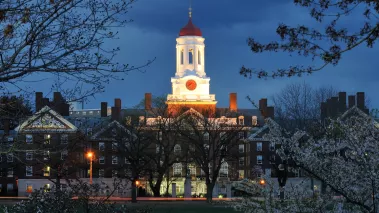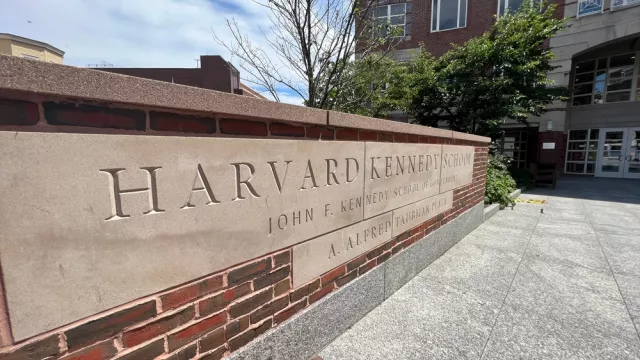Table of Contents
VICTORY: Harvard dean relents, will offer fellowship to human rights leader

Jorge Salcedo / Shutterstock.com
Two weeks after The Nation first reported that the dean of Harvard’s Kennedy School was blocking a fellowship offer to former head of Human Rights Watch Ken Roth — purportedly due to Roth’s criticism of Israel — the dean, Douglas Elmendorf, announced he changed his mind and that the initial decision was an “error.” In recent days, the controversy over that decision played out on Twitter and newspaper op-ed pages, prompted a letter from FIRE about academic freedom, and generated protests from hundreds of Kennedy School affiliates.
Roth led Human Rights Watch for nearly 30 years until he announced his retirement last April. Sushma Raman, executive director of the Kennedy School’s Carr Center for Human Rights Policy at the Kennedy School, reportedly approached Roth about joining the Center as a senior fellow. Roth had participated in events and debates at the Center since its founding, and the Center had hosted scholars in similar positions in the past, such as Amnesty International’s former executive director William Schultz and secretary general Salil Shetty.
Roth says an offer followed in May, which he accepted on June 9. But the process hit a snag when the Center forwarded the fellowship offer to the Kennedy School’s dean, Douglas Elmendorf, for formal approval. Shortly after Roth met with Elmendorf over video conference in July, the dean’s office informed the Center that it would not approve the fellowship. No explanation was given.
The Nation cited Harvard Kennedy School professor Kathryn Sikkink, who said she heard Elmendorf cite Roth’s “anti-Israel bias” as the reason for the denial. Sikkink later reiterated The Nation’s account to the Chronicle of Higher Education, explaining that Elmendorf shared his reasoning in a small meeting with her, Carr Center leadership, and a dean’s office staff member. The Chronicle reported that Mathias Risse, the Carr Center’s director, corroborated Sikkink’s account of what transpired at the meeting.

FIRE criticizes Harvard for rescinding human rights champion Ken Roth’s fellowship
News
Ken Roth is the second controversial figure to be disinvited from Harvard’s Kennedy School in recent years. It happened to military whistleblower Chelsea Manning in 2017.
The Nation’s Jan 5. article speculated that Elmendorf vetoed Roth’s fellowship due to pressure from donors and defense and intelligence officials at HKS who object to Roth’s public criticism of Israel. Roth echoed the speculation that Elmendorf’s decision was the result of donor pressure in an interview with The Harvard Crimson and in a Boston Globe op-ed.
If Roth and The Nation were right, it wouldn’t be the first time Elmendorf revoked an offer under pressure. In 2017, Elmendorf canceled whistleblower Chelsea Manning’s fellowship after then-CIA director Mike Pompeo publicly criticized the appointment. Manning is a former Army intelligence analyst who leaked classified diplomatic and military documents to Wikileaks in 2010.
On Jan. 6, FIRE sent a letter to Elmendorf urging him to approve Roth’s fellowship. To be clear, FIRE takes no position on the Israeli-Palestinian conflict. But as we reminded Elmendorf in our letter, Harvard promises its students and faculty freedom of expression and academic freedom — and these promises are undercut when the school blocks a fellowship offer because of an otherwise qualified candidate’s take on a controversial subject.
As we wrote:
The Kennedy School in particular has committed itself to “actively pursue the expansion and maintenance of an atmosphere that welcomes new ideas — even unpopular and controversial ones — and encourage an effective and active exchange of views in an environment of mutual respect. . . .”
But the Kennedy School undermines its laudable commitment to intellectual diversity and free inquiry when it rescinds a fellowship offer based on the candidate’s viewpoint or speech. Specifically, the Kennedy School fails to promote “an atmosphere that welcomes new ideas” when it denies a fellowship to an accomplished human rights advocate and acknowledged leader in the field over disagreement with some of his views.
Instead, the best response by those at the Kennedy School who object to Roth’s views is “more speech” in the form of reasoned criticism and debate. That debate would not be anything new for the Kennedy School. In years past, the school has hosted scholars on both sides of the Israel-Palestine debate, such as retired Israeli general Amos Yadlin and former secretary general of the Palestine Liberation Organization Saeb Erekat.
In Elmendorf’s email yesterday to the Kennedy School community, he denied allegations that donors influenced his original decision to veto the fellowship, but wrote:
I now believe that I made an error in my decision not to appoint him as a Fellow at our Carr Center for Human Rights. I am sorry that the decision inadvertently cast doubt on the mission of the School and our commitment to open debate in ways I had not intended and do not believe to be true.
Roth tweeted yesterday that he was “thrilled” with Elmendorf’s reversal and called for full transparency on what led to Elmendorf’s original decision. He also expressed concern about protecting the academic freedom of others at Harvard who may not have the same ability to mobilize a public response.
“How is the Kennedy School, and Harvard, going to ensure that this episode conveys a renewed commitment to academic freedom rather than just exceptional treatment for one well known individual?” he asked.
For now, Harvard’s about-face decision is a win for academic freedom, free inquiry, and even for those at the Kennedy School who disagree with Ken Roth: Now they will have the chance to debate him.
FIRE defends the rights of students and faculty members — no matter their views — at public and private universities and colleges in the United States. If you are a student or a faculty member facing investigation or punishment for your speech, submit your case to FIRE today. If you’re faculty member at a public college or university, call the Faculty Legal Defense Fund 24-hour hotline at 254-500-FLDF (3533). If you’re a college journalist facing censorship or a media law question, call the Student Press Freedom Initiative 24-hour hotline at 717-734-SPFI (7734).
Recent Articles
FIRE’s award-winning Newsdesk covers the free speech news you need to stay informed.

O holy fight: New Hampshire Satanic Temple statue threatened by more than vandals

California and other states are rushing to regulate AI. This is what they’re missing

One day after FIRE lawsuit, Congress passes changes to filming permits in national parks


